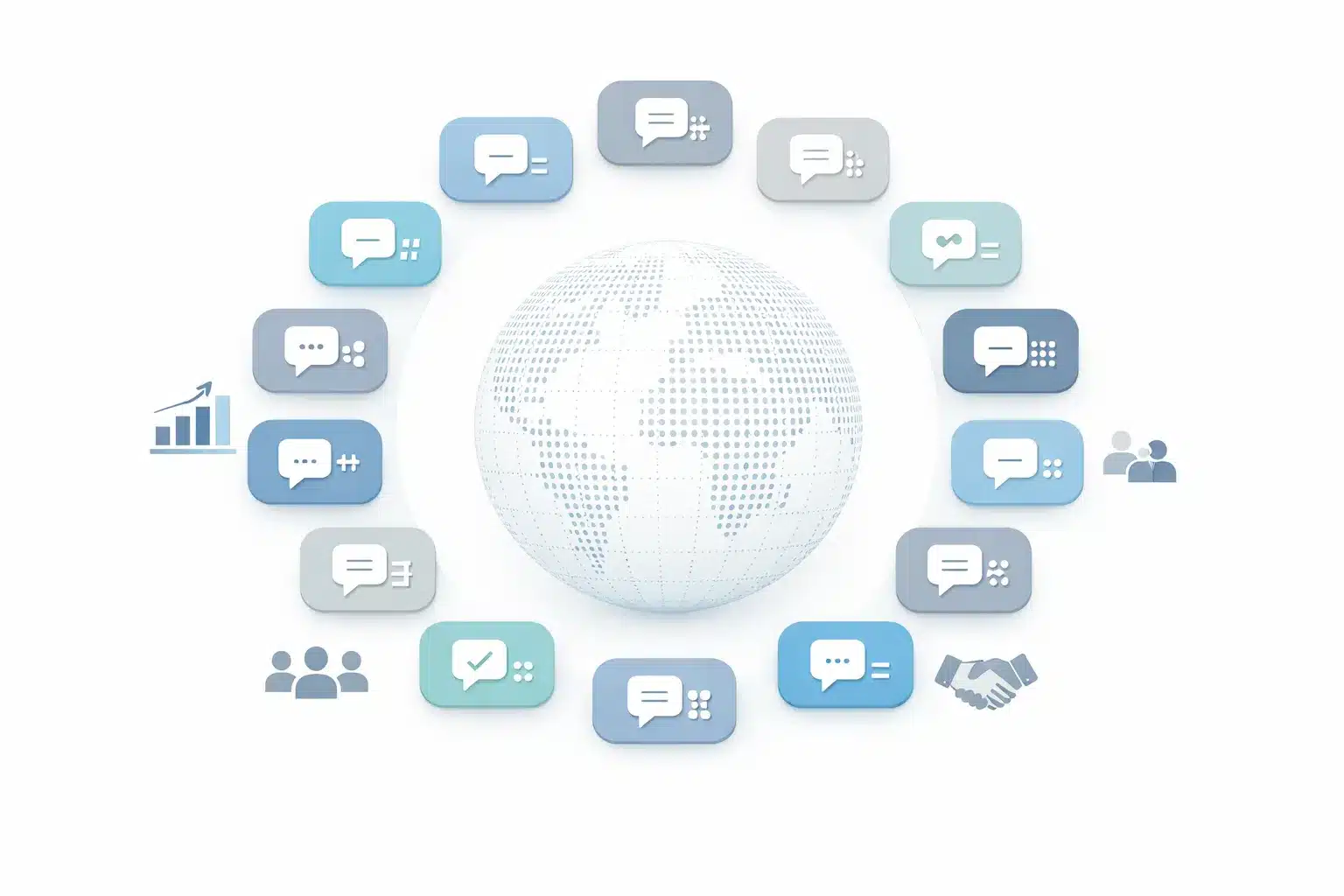The 12 most important languages of the future are Mandarin, English, Spanish, Arabic, French, Hindi, Portuguese, Japanese, German, Korean, Indonesian, and Swahili — selected based on 4 criteria: speaker population size, GDP contribution of native-speaking economies, projected growth rate, and demand in international business and diplomatic sectors.
According to Ethnologue’s 2024 edition, the world has 7,168 living languages. Of these, 23 languages account for more than half of the world’s total speakers. The 12 languages in this guide represent the highest combined economic output, fastest projected speaker growth, and broadest professional demand through 2050, based on data from the British Council, UNESCO, and the U.S. Department of State’s Critical Language Scholarship program.
Each language entry below covers 4 data points: current speaker count, primary native-speaking economies, GDP contribution, and key industries where proficiency delivers measurable career advantage — including finance, technology, energy, international law, and government.
The Top 12 Languages of the Future: Speaker Data & Economic Context (2026)
| Language | Native Speakers | Total Speakers (incl. L2) | Primary Economies | Key Industries |
| Mandarin | 920 million | 1.12 billion | China (GDP $18.5T) | Trade, tech, finance, manufacturing |
| English | 380 million | 1.4 billion | USA ($27T), UK ($3.1T), AUS ($1.7T) | Diplomacy, finance, tech, media |
| Spanish | 490 million | 560 million | Mexico, Colombia, Spain, Argentina | Trade, energy, agriculture, tourism |
| Arabic | 422 million | 422 million | Saudi Arabia, UAE, Egypt (MENA) | Oil & gas, Islamic finance, diplomacy |
| French | 80 million | 321 million | France ($3T), Belgium, African Union | Diplomacy, fashion, aid, agriculture |
| Hindi | 600 million | 600 million | India (GDP $3.7T) | IT, finance, Bollywood, manufacturing |
| Portuguese | 270 million | 270 million | Brazil ($2.1T), Angola, Mozambique | Energy, agribusiness, mining |
| Japanese | 125 million | 125 million | Japan (GDP $4.2T) | Automotive, electronics, robotics |
| German | 100 million | 132 million | Germany ($4.4T), Austria, Switzerland | Engineering, pharma, automotive |
| Korean | 77 million | 77 million | South Korea (GDP $1.7T) | Semiconductors, K-pop, electronics |
| Indonesian | 270 million | 270 million | Indonesia (GDP $1.3T, ASEAN #1) | Trade, palm oil, manufacturing, tech |
| Swahili | 200 million | 200 million | Kenya, Tanzania, Uganda, DRC | Agriculture, trade, tourism, mining |
Sources: Ethnologue (26th edition, 2024), World Bank GDP data (2024), IMF World Economic Outlook (2024), British Council Languages for the Future report.
What 4 Criteria Determine a Language’s Future Value?

A language’s future value is determined by 4 criteria: economic output of native-speaking countries, total and projected speaker population, political influence in international institutions, and professional demand across high-growth industries.
1. Economic Output — GDP of the countries where a language is official or dominant. Languages spoken in economies producing high GDP — Mandarin (China, $18T), German (Germany, $4.4T), Japanese (Japan, $4.2T) — deliver measurable career advantage in global trade, finance, and investment.
2. Speaker Population & Growth Rate — Current native speaker count and projected growth to 2050. Languages with large and growing speaker bases — Hindi (600M, +25% 2001–2011), Swahili (200M, expanding in East Africa), Indonesian (270M, ASEAN growth) — increase in value as their economies develop.
3. Political Influence — Official status in international institutions. English, French, and Arabic are the 3 most used languages in the United Nations system. French and German dominate European Union governance. Arabic governs 22-member Arab League states.
4. Professional Demand by Industry — Specific industries where language proficiency commands a measurable salary premium or career advantage. Arabic: oil and gas, Islamic finance. German: automotive, engineering, pharmaceuticals. Japanese: electronics, robotics, automotive. Korean: semiconductor, consumer electronics, entertainment.

What Are the 6 Established Global Languages of the Future?
#1 Mandarin Chinese
Mandarin Chinese is the most important language of the future for international business, with 1.12 billion total speakers across 37 countries and China contributing 18.4% of global GDP in 2024 (World Bank), making it the dominant language in trade, technology investment, and manufacturing supply chains.
With over a billion speakers worldwide, Mandarin has risen as the most spoken language globally since the country’s ascension to a major world power. Mandarin has become important for those pursuing business and career opportunities linked to China’s growing influence in global trade and investment. Additionally, Mandarin-speaking professionals have high demand in fields such as international relations, finance, and technology as many countries aim to strengthen their relations with China. Lastly, the rich cultural heritage of China makes it appealing for tourists, scholars, and artists to learn Mandarin for cultural understanding and personal growth.
#2 English
English is the world’s most widely spoken language with 1.4 billion total speakers including second-language users, serving as the official or co-official language of 67 countries and the working language of the United Nations, World Trade Organization, International Monetary Fund, and NATO.
Moreover, proficiency in English is essential for individuals interested in the field of diplomacy and those looking to pursue careers in international entities and organizations like the UN.
Lastly, due to its abundant presence in literature and its widespread use in popular entertainment and music sectors, the English language provides ample avenues for artists who speak it to broaden their reach and appeal to global audiences.
#3 Spanish
Spanish is the world’s second most spoken native language with 490 million native speakers across 21 countries, the official language of 4 of the world’s 10 fastest-growing economies (Mexico, Colombia, Peru, Chile), and the most studied foreign language in the United States with over 8 million learners enrolled in formal education.
It serves as a crucial tool in business and diplomacy, particularly in Latin America, a region that is seeing its economic influence grow. The significance of Spanish in the US has also been boosted in healthcare, education, and government industries due to the contribution of the Latino population in that country. Furthermore, the use of Spanish in cultural representation is noteworthy, as outstanding writers, artists, and filmmakers have implemented the language in their masterpieces. By learning Spanish, individuals can access both personal and professional growth opportunities, as well as the richness of the Spanish and Latin American cultures.
#4 Arabic
Arabic is the 5th most spoken language in the world with 422 million native speakers across 26 countries in the Middle East and North Africa (MENA) region, the official language of the Arab League’s 22 member states, and the dominant language in oil and gas, Islamic finance, and regional geopolitics — sectors managing an estimated $3 trillion in combined annual economic output.
Mastering Arabic can result in noteworthy personal development and heightened comprehension of diverse cultures. The Arabic language can offer opportunities in diverse fields like finance, energy, and international relations. Additionally, its significance has grown with the spread of a major religion, Islam. The language is closely linked to this faith, and its relevance is especially clear in the realms of politics and economics.
#5 French
French is an official language in 29 countries with 321 million speakers worldwide, the 3rd most used language in international business after English and Mandarin, and the primary working language of the European Union, African Union, and International Red Cross — institutions with combined governance over 1.3 billion people.
With its official status in 29 countries and over 300 million speakers worldwide, learning French can be highly beneficial l for those interested in international business, diplomacy, and cultural exchange. Individuals working in diverse fields such as finance, fashion, and tourism have much to gain by acquiring this valuable language since France is a dominant member of the European Union with a robust economy. Furthermore, career-seekers in international organizations such as the United Nations and UNESCO can also gain from learning French.

What Are the 6 High-Growth Languages of the Future?
#6 German
German is highly valued in various industries due to its economic and business significance. It is widely spoken with over 100 million speakers, particularly in the European Union, as an official language of Germany, Austria, and parts of Switzerland. Germany’s significance in the European Union reinforces the importance of learning the German language if you are interested in conducting business or pursuing a career in Europe. Learning German can open doors to world-class education and career opportunities in fields like science, engineering, and medicine.
German is the most spoken native language in Europe with 100 million native speakers across Germany, Austria, Switzerland, and Luxembourg, the official language of the EU’s largest economy — Germany with GDP of $4.4 trillion (IMF 2024) — and the dominant language in automotive manufacturing, chemical engineering, and precision machinery industries with combined exports exceeding $1.5 trillion annually.
#7 Hindi
Hindi is the 3rd most spoken language in the world with 600 million speakers across India, Nepal, Mauritius, and Fiji, the official language of India — the world’s 5th largest economy with GDP of $3.7 trillion in 2024 (IMF) — and the primary language of the Bollywood film industry producing 1,800–2,000 films annually.
The reason behind this is mostly the growth of India on the global scene, where the country is now seen as a flourishing economy. India currently ranks sixth globally in terms of GDP. In addition, Hindi is the language of Bollywood, a foremost industry known for producing influential movies with significant impact on global popular culture. Lastly, Hindi is also widely spoken across Nepal, Mauritius, and Fiji, providing opportunities for international business and cultural exchange.
#8 Japanese
Japanese is the official language of Japan — the world’s 4th largest economy with GDP of $4.2 trillion (IMF 2024) — with 125 million native speakers, and the primary language of the world’s largest automotive and consumer electronics industries, including Toyota, Sony, Honda, and Panasonic.
It is a language that is worth learning due to the country’s technological innovations, booming automotive industry, and pop culture, not to mention that it is home to over 127 million speakers. Learning Japanese can be a great asset in certain fields, including manufacturing, technology, and finance. It is beneficial for those who plan to pursue a career in diplomacy and international relations, considering Japan holds substantial influence in worldwide politics and sustains robust connections with neighboring countries in Asia. Additionally, Japan is home to a diverse cultural legacy, including both traditional and contemporary artistic endeavors such as Kabuki and anime. This makes it a stimulating location for those seeking to immerse themselves in Japanese culture. But it doesn’t stop at self-improvement. Those interested in moving to Japan for their studies can also benefit from learning this language. It’s a fact that Japan’s universities have received high ratings for their diverse academic programs, making it an appealing location for those seeking international study opportunities.
#9 Indonesian
Indonesian is the official language of Indonesia — the world’s 16th largest economy with GDP of $1.3 trillion (IMF 2024) and the 4th most populous country with 277 million people — with over 270 million speakers, making it the most spoken Austronesian language and a critical business language for ASEAN regional trade and investment.
Additionally, Indonesia’s diversity, with over 300 ethnic groups, makes it a remarkable destination for cultural exchange and personal expansion. Its unique blend of cultures, including Indian, Chinese, and Islamic influences, contributes to a thrilling and vivid art, music, and culinary scene.
#10 Korean
Korean is the official language of South Korea — the world’s 13th largest economy with a GDP of $1.7 trillion (IMF 2024) — with 77 million speakers worldwide, and the primary language of the global K-pop, K-drama, and Korean technology industries, including Samsung, LG, and Hyundai, which generated combined revenues exceeding $400 billion in 2023.
Presently, Korean has over 77 million speakers around the world and is the official language of both North and South Korea. South Korea dominates the global market with its prosperous export-oriented economy, with major corporations like Samsung and LG. Thus, fluency in Korean is valuable for professionals in fields like automotive manufacturing, telecommunications, and electronics. In addition, the prevalent media of South Korea, which encompasses films, music, and TV programs, has attained widespread appeal across the globe, causing a surge in the call for education in the Korean language and culture.
#11 Turkish
As a result of Turkey’s growing economy and cultural influence, Turkish has become a language of importance on a global scale, with over 80 million speakers globally. Turkey’s unique location between Asia and Europe provides a platform for cultural and financial exchanges. Proficiency in Turkish can offer advantages in various fields, such as tourism, finance, and technology. Turkey’s economy ranks 19th in the world, attracting numerous multinational companies that choose it as their regional center. Additionally, Turkey is rich in valuable energy resources, including oil, natural gas, and coal. Additionally, Turkey prides itself on its extensive cultural heritage, which spans several millennia. Learning the language provides insights into the engaging aspects of the country’s culture. Finally, Turkey’s strategic location makes it a significant player in international relations and diplomacy, making Turkish proficiency valuable in these domains.
#12 Bengali
Spoken by over 230 million people worldwide, Bengali is another very valuable language to learn. It serves as the national language of Bangladesh, and it’s also the state language of West Bengal, India. It is also spoken in several nations across the globe where a large. Furthermore, with its booming textile industry and strategic location, Bangladesh presents opportunities for businesses to connect with other Asian countries. Proficiency in Bengali can help individuals tap into these emerging markets and connect with the diaspora community globally. The Bangladeshi community is present. Bengali’s cultural value is not limited to its significance in business and industry, as it has a well-established literary and artistic history that boasts of notable writers like Rabindranath Tagore. Bangladesh’s culture is also vibrant and captivating, including its music, dance, and festivals.
Final Thoughts
In conclusion, learning a new language can be necessary for personal and professional development, particularly in the modern, interconnected world. Given the increasing importance of economic, political, and cultural exchange, it is essential to determine the languages that offer the most potential for growth.
At Circle Translations, we provide language services in over 100 languages, covering translation, interpretation, localization, and language training. We offer tailored solutions for your specific objectives, focusing on reliable and high-quality outcomes. Whether you’re interested in Mandarin Chinese for business, Spanish for emerging markets, or German for academic growth, we can help you achieve your language goals. Contact us now to learn more about how we can assist in your navigation of the world of language and culture with assurance and comfort.
Frequently Asked Questions
What is the most important language of the future for business?
Mandarin Chinese is the most important language of the future for international business, with 1.12 billion total speakers and China contributing 18.4% of global GDP (World Bank, 2024). English remains the primary language of global diplomacy, technology, and finance, with 1.4 billion total speakers and official status in 67 countries.
Which languages will be most useful in 2050?
The British Council’s Languages for the Future report identifies 8 languages as most strategically valuable by 2050: Mandarin, Arabic, French, German, Portuguese, Italian, Spanish, and Japanese. Hindi and Swahili are projected to gain significant importance driven by India’s and East Africa’s economic growth rates of 6.8% and 5.5% respectively (IMF, 2024).
How many people will speak Mandarin in the future?
Mandarin currently has 920 million native speakers and 1.12 billion total speakers including second-language learners (Ethnologue, 2024). As China’s GDP continues to grow — reaching $18.5 trillion in 2024 — demand for Mandarin proficiency in international trade, technology, and investment is projected to increase through 2050.
Is Arabic a good language to learn for the future?
Arabic is one of the 12 most valuable languages of the future, with 422 million native speakers across 26 countries in the MENA region, official status in the Arab League’s 22 member states, and dominant use in oil and gas, Islamic finance, and regional geopolitics — sectors managing an estimated $3 trillion in combined annual economic output.
Why is Swahili considered a language of the future?
Swahili is the most widely spoken African language with 200 million speakers across 14 East African countries including Kenya, Tanzania, Uganda, and DRC. East Africa’s average annual GDP growth rate of 5.5% (World Bank) and the African Continental Free Trade Area (AfCFTA) agreement — covering 1.3 billion people — make Swahili a high-value language for future trade and investment.
What translation services does Circle Translations offer for future languages?
Circle Translations provides professional translation services for all 12 languages of the future, including Arabic Translation Services, Japanese Translation Services, Korean Translation Services, German Translation Services, Hindi Translation Services, Indonesian Translation Services, Portuguese Translation Services, and Chinese (Simplified) Translation — delivered by ISO 17100-certified translators with subject-matter specialization.
Which language is growing the fastest in the world?
Hindi is the fastest-growing major language by new speaker acquisition, expanding by 25% from 2001 to 2011 and gaining nearly 100 million new speakers in that decade (Census of India). Swahili and Indonesian also show above-average growth driven by East Africa’s and ASEAN’s economic expansion and young population demographics.
What languages are most in demand for translation services?
According to CSA Research, the 5 most in-demand language pairs for professional translation are English-Spanish, English-Mandarin, English-German, English-French, and English-Arabic. These language pairs account for the highest volume of legal, technical, medical, and marketing translation projects globally in 2024.
Subtitles

Professional and Accurate Subtitle Services for your Videos.
- Video subtitles specifically tailor-made for improving accessibility.
- Using highly experienced subtitlers with years of industry experience.
- Professionally written and expertly timed.
Translation

We help the world’s top companies translate their content in over 73 languages!
- We localize content for internet websites, games, travel, cryptocurrencies, and more
- Expand your global audience by adding different languages.
- We work only with qualified translators and experienced content creators
Audio translation

Ensuring full accessibility for Blind and visual impaired audiences.
- Visual descriptive events as they occur in the video.
- Working with top audio describers to perfectly describe what is happening on-screen
- Professional sound recording.














